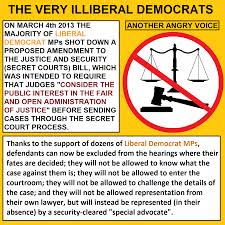
记忆方法
将“illiberal”拆分为“il”和“liberal”。记住“il”意味着相反,而“liberal”代表自由、开明的。因此,将这两个词组合在一起,可以想象成“不自由的”或者“限制性的”,这样就能记住“illiberal”的含义是“保守的”或“不宽容的”。
以上内容由AI生成, 仅供参考和借鉴
中文词源
illiberal 不开明的
il-,不,非,liberal,开明的。
英语词源
- illiberal (adj.)
- 1530s, "ungentlemanly, base, mean," from Middle French illiberal (14c.), from Latin illiberalis "ungenerous, mean, sordid; unworthy of a freeman," from assimilated form of in- "not, opposite of" (see in- (1)) + liberalis (see liberal). A sense of "narrow-minded politically; unconcerned with the rights or liberties of others" is attested from 1640s, and might conceivably be revived to take up some of the burden that drags down conservative.
权威例句
- 1. His views are markedly illiberal.
- 他的观点非常狭隘。
- 2. Expressing illiberal views may bring some politicians into temporary prominence.
- 发表偏狭之见也许能使某些政治家名噪一时.
- 3. Their tendency is gross and illiberal.
- 说这种话显得粗野,缺乏教养.
- 4. Butler , deeply illiberal, exerted his rights.
- 巴特勒心胸狭窄, 滥用自己作为丈夫的权力.
- 5. By any sensible measure, this 100 - year struggle has been illiberal, murderous and pointless.
- 根据切合实际的规则, 这场百年战争是不开明的 、 凶残而无意义的.